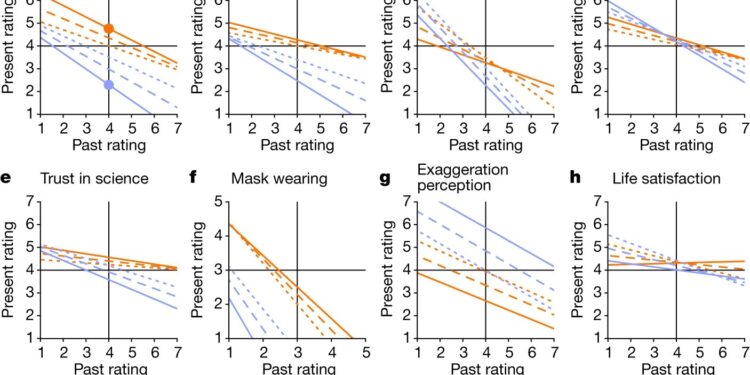Biased recall of pandemic perceptions and behaviors in Study 1. Results of a linear regression predicting individual recall of past perceptions based on actual past evaluations (X axis) in 2020-2021 and current grades (Yes axis) at the end of 2022, as well as interactions with vaccination status (colors) and vaccination status identification (VSI; dotted and dotted lines) of not = 1,644 participants (unless otherwise stated) for probability of infection (A), severity of infection (b), emotional risk (vs), trust in government (d; not= 1,600), trust in science (e; not = 1,489), wearing a mask (F; not = 1,600), perception of exaggeration (g) and life satisfaction (h; not = 1,539). Each row indicates recall at the midpoint of the scale (e.g., recall = 3 for mask wearing and recall = 4 for all other variables), as predicted by past and present assessments. The direction and strength of the bias is indicated by the position of the line relative to the midpoint of the scale; the angle indicates the extent to which recall is influenced by past and present perceptions (the more horizontally it is oriented, the more it is influenced by current evaluations; the more vertically it is inclined, the more it is influenced by past evaluations). Example: the lines in A represent the predicted recall of infection probability = 4 given different past and present ratings, so the dots mark this recall given the actual past rating of 4 for highly identified vaccinated and unvaccinated individuals. The respective lines are angled below (vaccinated) and above (unvaccinated) the midpoint. This indicates that people’s recollection of the probability of infection is influenced by their current assessment of the probability, and that this influence goes in different directions for vaccinated and unvaccinated individuals (with recalled probability of infection). higher and lower than that actually perceived in the past). See “Study 1: Analyzes” in Methods for more information; Regression tables are provided in Extended Data Table 1. Credit: Nature(2023). DOI: 10.1038/s41586-023-06674-5
A quartet of psychologists, economists and health behaviorists from the University of Bamberg, the University of Chicago, the University of Vienna and the University of Erfurt, respectively, found that opinions People’s policies on vaccination colored their memories of the severity of the global crisis. pandemic.
In their article published in the journal Nature, Philipp Sprengholz, Luca Henkel, Robert Böhm and Cornelia Betsch describe how they conducted population surveys about the pandemic and what they learned from them. The editors of Naturepublished a research paper describing the work the team did in this effort, as well as an editorial discussing the possible implications of their findings.
Most health organizations around the world have considered the global pandemic to be over, even though people around the world are still infected with the SARS-CoV-2 virus, due to the degree of immunity that has developed . both by infected people and by those who have been and continue to be vaccinated.
By all accounts, the pandemic was a major event in modern world history: in addition to the many people who fell ill or died, most of the world’s economies were hit hard. And because it was such a major event, many in the scientific community began to look back – some at its many impacts, and others looking for lessons learned.
In this new effort, the research team suggests that one lesson is that once the pandemic is over, people will remember it differently, depending on their political views — in this case, their point views on vaccination.
To learn more about how people remember the severity of the pandemic, the research team surveyed more than 10,000 people living in 11 wealthy countries in the Northern Hemisphere, asking them to rate their risk of ‘infection. Some of these people living in Germany had responded to a survey previously conducted by the same group, asking them the same questions. In the second round, Germans were also asked to try to remember how they had assessed their risk in the first survey.
Looking at data from German participants, the researchers found, among other things, a trend: people who hadn’t been vaccinated and who had strong feelings about it tended to remember that they were assessing their risk to a lower level than they actually had. They also found that people in the same group who had been vaccinated tended to remember seeing themselves as more at risk than they actually were. In other words, both groups were rewriting history based on their political feelings about vaccination.
The researchers suggest that their findings indicate that those involved in examining the pandemic should keep in mind that respondents’ memories may be clouded by their own biases.
More information:
Philipp Sprengholz et al, Historical accounts of the COVID-19 pandemic are motivationally biased, Nature(2023). DOI: 10.1038/s41586-023-06674-5
Personal motivations polarize people’s memories of the COVID-19 pandemic, Nature(2023). DOI: 10.1038/d41586-023-03082-7
© 2023 Science X Network
Quote: Societal polarization regarding vaccinations distorts the accuracy of people’s memory of the pandemic (November 26, 2023) retrieved November 26, 2023 from
This document is subject to copyright. Except for fair use for private study or research purposes, no part may be reproduced without written permission. The content is provided for information only.



